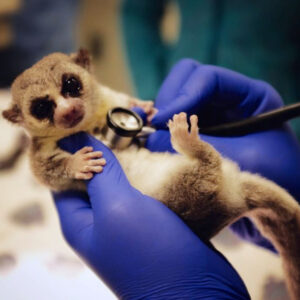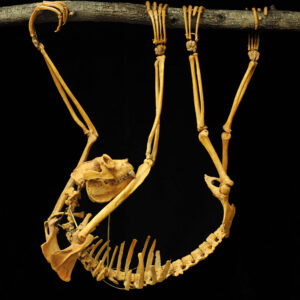Through non-invasive research, staff at the Duke Lemur Center learn how to better care for lemurs onsite and aid conservation efforts for wild lemurs in Madagascar.
Why Research Matters
“It’s important to know what variables most affect lemurs’ reproductive health, social dynamics, food acquisition, and other things of that nature,” says the DLC’s Director of Research, Erin Ehmke, Ph.D. “By learning what most affects lemurs’ survival and reproduction, we can better focus our conservation efforts in Madagascar. And for our lemurs living here in Durham, we can focus our husbandry practices in ways that best accommodate lemurs’ dietary, social, and other needs.”
Lemurs aren’t the only ones who benefit from these projects: Data from certain studies may even be applicable to human health research. Gray mouse lemurs show evidence of cognitive decline as they get older, and their brains shrink as they age—similar to the aging brains of humans. Early evidence indicates that some mouse lemurs develop plaques and tangles in the brain, a symptom common to Alzheimer’s disease. Our non-invasive research with mouse lemurs could help explain the initial stages of Alzheimer’s and other neurodegenerative diseases, helping doctors identify people at risk sooner or pointing to new ways to delay onset or slow progression of the disease.
Similarly, promoting successful hibernation in the DLC’s colony of fat-tailed dwarf lemurs—the only primates in the world that hibernate—not only improves the lemurs’ care and health, but could also inform biomedicine in the treatment of diabetes and other metabolic disorders, extend the lives of people awaiting organ transplants until suitable donors are found, and help us understand mechanisms that defy aging. Hibernation research is one of the DLC’s primary focuses.
From their evolutionary relationship to humans to their diverse and unique biology, lemurs are a fascinating study system. The DLC’s “do no harm” research program is dedicated to learning about these critically endangered species, and is proud to prioritize the wellbeing of each individual and the conservation of species while also facilitating scientific advancement. The DLC does NOT allow research that will harm the animals.
Accreditation
The Duke Lemur Center is accredited by the Association of Zoos and Aquariums (AZA), which means it meets the highest standards for animal welfare, health, and nutrition. To maintain AZA accreditation, the DLC must pass an assessment every five years. At our inspection in 2021, the DLC received an extremely rare perfect score.
The Duke Lemur Center is also accredited by AAALAC International, which means it meets the highest standards for animal welfare, health, and nutrition for animals used in research. (All DLC research is non-invasive.) AAALAC-accredited institutions like the DLC help raise the global benchmark for animal well-being in science. To maintain AAALAC accreditation, we must pass an assessment every three years.
The DLC is proud to be the only organization in the world that holds accreditations from both the AZA and AAALAC International.
Types of Research
The DLC houses nearly 250 individual animals across 12 species. We are home to nocturnal, diurnal, and cathemeral animals, as well as species that encompass a wide range of social systems, modes of locomotion, and dietary preferences. Such variety yields a large and diverse research program, and we host an array of projects.
In particular, the DLC provides opportunity for observational and experimental research under ecologically relevant and controlled settings. Some projects explore lemur behaviors through observational studies in the forest, some collect fecal samples for microbiome research, and others study lemurs’ mental and physical capabilities by exploring lemur cognition and biomechanics. The one thing that all research projects have in common is that they are non-invasive. We do NOT allow research that will harm the animals, and all projects go through a multi-step approval process.
Training and Preparation: While many of the DLC’s research projects are observational studies in which scientists observe lemurs’ natural behaviors in the surrounding forest, some studies require preparatory positive-reinforcement training with the lemurs. Lemurs voluntarily participate in these training sessions and studies, receiving food rewards and enrichment in return for helping researchers gain valuable data.
BioBank: Because all DLC research is non-invasive, an extensive and curated specimen BioBank enables projects that cannot be performed with our living collection. In addition, the DLC Museum of Natural History houses the DLC’s osteology collection and more than 35,000 fossils and subfossils that are available for study.
In-house Research: The DLC has two research themes, occurring onsite and in Madagascar, that are spearheaded by DLC staff scientists: hibernation and the gut microbiome. Other research projects are led by external researchers, including students, postdoctoral fellows, and faculty across the globe. We welcome new researchers and new projects. If you are interested in researching at the DLC, please see our information for external researchers.
Research Advisory Committee
In 2019, the DLC formed a new standing Research Advisory Committee (RAC) that meets routinely to help advise the DLC on the development of strategies and collaborations needed to strengthen its research program. Current RAC members include:
Doug M. Boyer, Duke University
Christine M. Drea, Duke University
Mitch T. Irwin, Northern Illinois University
Peter A. Larsen, University of Minnesota
Kathleen M. Muldoon, Midwestern University
John F. Rawls, Duke University
Alexandra G. Rosati, University of Michigan
Daniel O. Schmitt, Duke University






